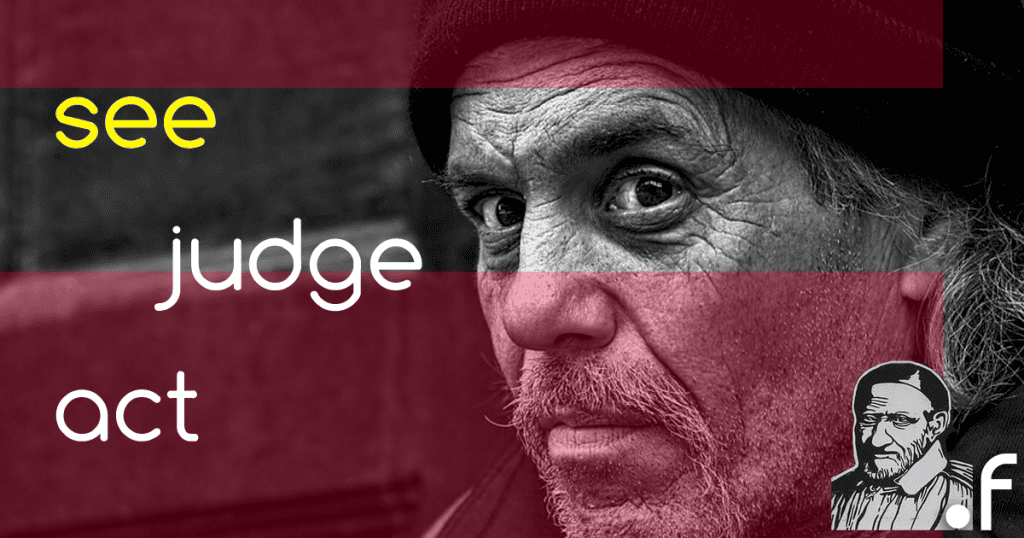
Seeing is the necessary beginning of systemic change. Systemic change requires looking anew at something we see…but do not see. This kind of seeing is really more like reading, reading the “signs of the times.”
St. Vincent was a man of the concrete whose starting point is direct knowledge of events about which he reflects before acting. So we often find in his letters and conferences the verbs “see” or “look.”
Asking Pope Innocent X in 1652 to intervene in favor of peace he describes the horrors of the war and he adds:
It is a small thing to hear or read these things; they must be seen and ascertained with one’s own eyes. ( IV, 458) (4, 446)
St. Vincent did not immediately turn upon the world this compassionate look which we know and which made him undertake a rich diversity of apostolic and charitable works. He acquired it progressively along a complex route. It is only little by little that he learned to “see” in depth the world and the Church with the very eyes of Christ, and to read there how God was calling him through the appeals of the poor and the abandoned.
With the help of a classic article by Father Emeric Amyot d’Inville, CM “To see and discern the present day challenges from the perspective of St. Vincent” we can trace this evolution. That will help us to stand back and assess the outlook which we direct on to the world and the Church and which determines our manner of situating ourselves there and acting there.
To experience certain realities that raise fundamental questions
Let us reflect on that which was decisive for Vincent as he came to an awareness of the great challenges of his time. It would be good to point out the fact that for many years Vincent had firsthand knowledge of the material and spiritual misery of poor people, but this knowledge did not present Vincent with any challenge.
During the first fourteen years of his life Vincent experienced poverty and suffered as a result of this. Then for the next twenty-two years he wanted to escape poverty. In other words this lived experience of poverty was not transformed into some type of an awareness of a challenge that had to be confronted. At the same time, however, Vincent did not reject poverty, he simply want to escape this situation and desired the same for his family. We also see that at this stage of his life Vincent was focused on himself and on his family.
As Vincent became aware of the challenges of his time, it was necessary for him to undergo some powerful experiences, some important events that would sensitize him and open him to the neighbor and to God and to God’s will for him. He would be touched and moved.
As he said on so many occasions, he felt a great compassion in the midst of such great misery (CCD:IX:165). Yet, he also felt challenged and called to act in order to relieve the suffering of these people … in other words his life was changed. In fact, when confronted with so many different forms of material and spiritual suffering Vincent felt as though he had been possessed by the very charity of Christ who dwelt within him and inspired his spirit.
Charity means we can’t see someone suffering without suffering along with them, or see someone cry without crying as well. This is an act of love, causing people to enter one another’s hearts and to feel what they feel, far from those persons who have no feeling for the anguish of the afflicted, or the suffering of poor persons. Ah, how tenderhearted the Son of God was! They call Him to go see Lazarus! He goes … He weeps along with them. It is this sensitivity that caused Him to come down from heaven. He saw that people were deprived of His glory, and he was moved by their misfortune (CCD:XII:221).
We know that in Vincent this love was not only affective but also effective, specific and inventive in order to relieve people of their suffering and communicate to them the good news of salvation.
This openness of the heart to the neighbor and to God enabled Vincent to understand events and hear the call of God. In this way he came to understand the real challenges of society and the church and at same time discovered that he was able to act in a way that would make an effective contribution to resolving these situations.
The fundamental experiences that led Vincent to become more aware of God’s presence and more aware of his ministry were:
• In the encounter with the dying peasant in Folleville he “saw” spirituality poverty … and this seeing led to the missions that followed
• In the encounter with the poor sick family in Châtillon he “saw” physical poverty … and this see led to the formation of the first Confraternity of Charity.
And now what for us?
What are the experiences that have made me see physical poverty? What might be the Châtillon moments in my life?
What experiences opened my eyes to the great challenges of evangelization today? What might be the Folleville moment in my life?
For more detail…
- 1 The formation of the vision of an apostle
- 2 What path did Saint Vincent follow in order to discern the challenges of his time
To be continued with “To reread events in light of the Word of God.”







0 Comments